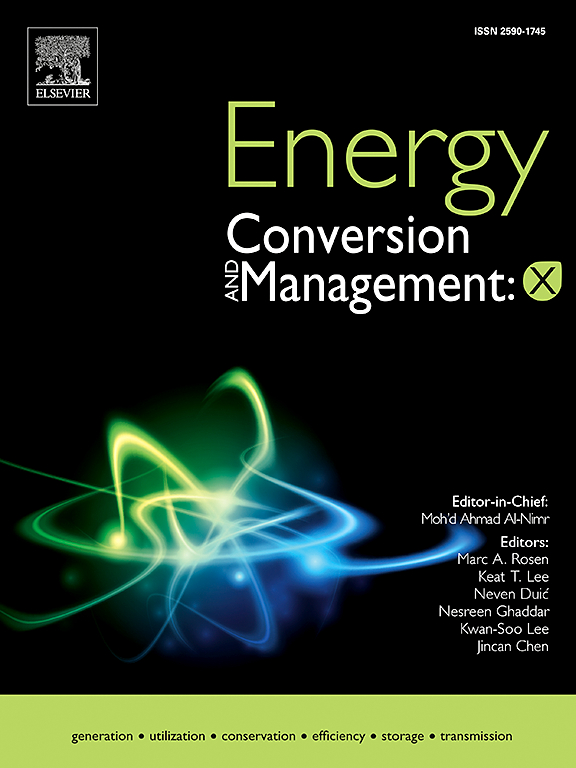Hybrid local energy markets in Japan: assessing the impact of regional renewable energy integration, demand flexibility, and consumer behavior
IF 7.6
Q1 ENERGY & FUELS
引用次数: 0
Abstract
The increasing penetration of distributed energy resources is transforming conventional power systems, necessitating innovative market structures to enhance energy efficiency, reduce grid dependency, and improve economic sustainability. This study proposes a decentralized hybrid local energy market (HLEM) that integrates peer-to-peer trading and community-based market mechanisms to facilitate both intra- and inter-community energy exchanges across different regions in Japan. The model incorporates market participants’ risk attributes, shaped by demand elasticity, into the decision-making process to evaluate market participation and trading behavior. A decentralized optimization framework is used in the model, utilizing the Alternating Direction Method of Multipliers, which guarantees both computational efficiency and feasibility. Furthermore, Jain’s Fairness Index serves to assess fairness and the level of participant engagement within the market. The framework is validated, using real-time data collected from the Japan Electric Power Exchange market, taking into account regional differences in demand trends, price responsiveness, and the availability of renewable energy. The results indicate that local generation has a considerable effect on market pricing systems, influencing demand patterns. Tokyo and Chubu achieve grid independence six and five times, with average price reductions of 21 percent and 14 percent, respectively. In contrast, Tohoku achieves grid independence for the one-time slot, while Kyushu remains entirely dependent on external resources, resulting in the lowest price reductions. Additionally, equity among participants is enhanced with the availability of local generation via HLEM, particularly in areas where demand flexibility is greater. The findings emphasize the capability of hybrid market frameworks to improve energy adaptability, lessen dependence on the upstream grid, and foster fair energy distribution.
日本混合地方能源市场:评估区域可再生能源整合、需求灵活性和消费者行为的影响
分布式能源的日益普及正在改变传统的电力系统,需要创新的市场结构来提高能源效率,减少对电网的依赖,并提高经济的可持续性。本研究提出了一个分散的混合地方能源市场(HLEM),该市场整合了点对点交易和基于社区的市场机制,以促进日本不同地区的社区内部和社区之间的能源交换。该模型将市场参与者的风险属性(由需求弹性形成)纳入决策过程,以评估市场参与和交易行为。模型采用分散式优化框架,利用乘数交替方向法,保证了计算效率和可行性。此外,Jain的公平指数用于评估市场中的公平性和参与者参与水平。利用从日本电力交易市场收集的实时数据,考虑到需求趋势、价格响应和可再生能源可用性的区域差异,对该框架进行了验证。结果表明,本地发电对市场定价系统有相当大的影响,影响需求模式。东京和中部分别实现了6次和5次电网独立,平均价格分别下降了21%和14%。相比之下,东北实现了一次性的电网独立,而九州仍然完全依赖外部资源,导致最低的价格下降。此外,通过HLEM提供本地发电,特别是在需求灵活性较大的地区,参与者之间的公平性得到了加强。研究结果强调了混合市场框架提高能源适应性、减少对上游电网的依赖和促进公平能源分配的能力。
本文章由计算机程序翻译,如有差异,请以英文原文为准。
求助全文
约1分钟内获得全文
求助全文
来源期刊

Energy Conversion and Management-X
Multiple-
CiteScore
8.80
自引率
3.20%
发文量
180
审稿时长
58 days
期刊介绍:
Energy Conversion and Management: X is the open access extension of the reputable journal Energy Conversion and Management, serving as a platform for interdisciplinary research on a wide array of critical energy subjects. The journal is dedicated to publishing original contributions and in-depth technical review articles that present groundbreaking research on topics spanning energy generation, utilization, conversion, storage, transmission, conservation, management, and sustainability.
The scope of Energy Conversion and Management: X encompasses various forms of energy, including mechanical, thermal, nuclear, chemical, electromagnetic, magnetic, and electric energy. It addresses all known energy resources, highlighting both conventional sources like fossil fuels and nuclear power, as well as renewable resources such as solar, biomass, hydro, wind, geothermal, and ocean energy.
 求助内容:
求助内容: 应助结果提醒方式:
应助结果提醒方式:


